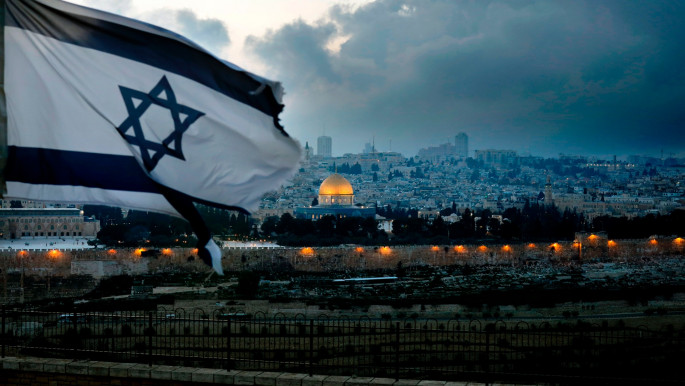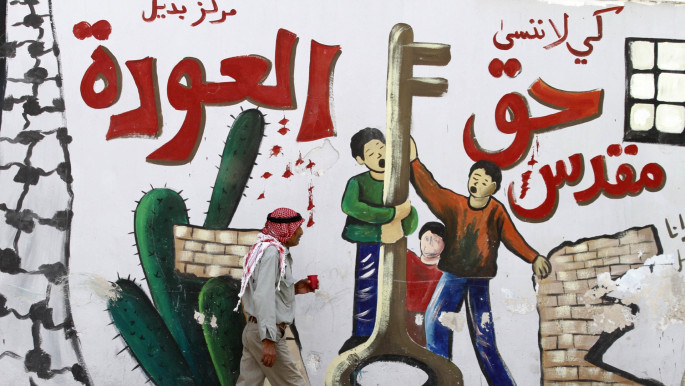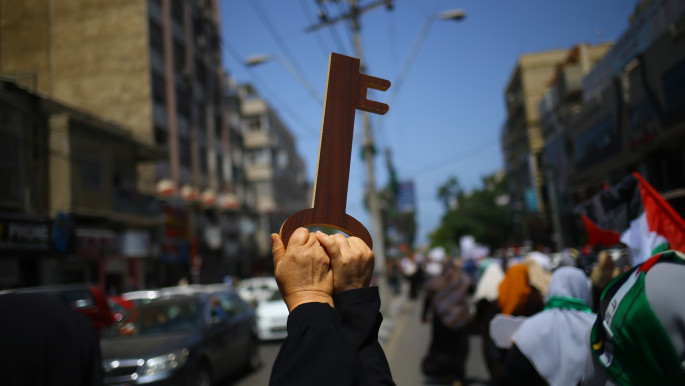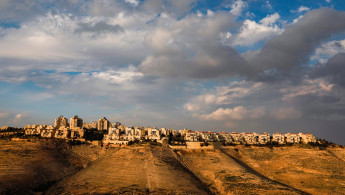The common thread between Palestine's Nakba and Israeli annexation
With Israeli Prime Minister Benjamin Netanyahu at the helm for the next 18 months, the government committed to annexing Israeli settlements in the coming weeks and created a "ministry of settlements" to carry out the plan.
International objections and condemnations preceded the swearing-in ceremony. But the new shaky coalition relies in its strength and impunity on the unquestioning and ideological support of the current US administration.
And with little indication that international opposition to this clear violation of international law will translate into a deterrent, Palestinians view the impending formal annexation as a decisive turning point in their ongoing Nakba, one that threatens to impose more displacement, additional losses of land, and even more despair.
For Palestinians, the Nakba was never just a memory of a distant painful atrocity. Instead, it is a date marking the beginning of an ongoing injustice that was predicated on the denial of their national identity, their collective uprooting,and, most painfully, their cultural, political, and material erasure as a people.
 |
|
| Read more: The day after annexation: Israel, Palestine and the one-state reality |
This erasure was done on many levels and in different ways and it has accelerated in an unprecedented manner in recent years.
Immediately following the Nakba, the Palestinian question was framed as a humanitarian one devoid of any political context in international fora. As if Palestinians suddenly became uprooted refugees in need of humanitarian assistance, their political plight and inalienable rights were completely omitted from the international discourse until the birth of the post-Nakba Palestinian national liberation movement in the mid-1960s.
Meanwhile, the newly formed Israeli state imposed military rule on the Palestinian population that came under its control and became citizens of the state, during which Israel stripped Palestinians, who owned nearly 90 percent of territory in historic Palestine, of their land. As a new detailed study by Human Rights Watch (HRW) shows, this determined and systematic policy reduced Palestinian ownership of land to a mere 3 percent.
The land grab was done through a combination of confiscation, appropriation, and the takeover of so-called absentee property, which belonged to Palestinians forcibly exiled and never allowed to return, or in some cases, Palestinians who stayed inside Israel and became citizens but were stripped of the title to their lands and properties. Meanwhile agencies that took control of the land, like the Jewish National Fund, executed the specific mandate of developing and leasing land for Jews.
 |
In recent years, the displacement and replacement paradigm upon which Israel was founded has gone into overdrive |  |
This wholesale land grab allowed the Israeli state to box in Palestinian-Israelis, who constitute 21 percent of its citizens, and deprive them of the right to expand and develop their communities. It is one of the most extensive and effective tools of institutional racism that Israel has employed against Palestinians since the country's violent birth.
According to HRW's report, "since 1948, the [Israeli] government has authorized the creation of more than 900 'Jewish localities' in Israel, but none for Palestinians, except for a handful of government-planned townships and villages in the Negev and Galilee, created largely to concentrate previously dispersed Bedouin communities".
The policy did not change after military rule over Palestinian-Israelis ended in 1966. Instead, it got more vicious and strategic, entrenching further the reality of erasure by way of discrimination. In fact, the policy was extended to the Palestinian Territory, including East Jerusalem (OPT), which was occupied by Israel in 1967, manifesting itself there in the illegal settlement regime that now controls at least 60 percent of the occupied West Bank.
 |
|
| Read more: Remembering 72 years of the Nakba in the shadow of annexation |
In the OPT, Israel used land confiscation, home demolitions, the separation wall, and other methods to contain the occupied Palestinian population in confined geographic locations and displace those who obstructed the growth of illegal settlements by several means, including making their lives utterly unbearable and depriving communities of water.
In recent years, the displacement and replacement paradigm upon which Israel was founded has gone into overdrive, owed mostly to the sharp rise of religious Zionism and emboldened by the rise of right-wing, populist and xenophobic leaders like Donald Trump. Where in other times, Israeli governments went to great trouble to shield their image and prevent accusations of racism and/or discrimination, Israel's right now boasts about such policies as the patriotic and necessary course of action.
A prime example of such unabashed racism was the adoption of the 'Nation-State Law' in 2018, which etched in stone Israel's colonial and discriminatory policies towards the Palestinian people and set into law its denial of Palestinian national rights. Among many other apartheid-like stipulations, the law states that only the Jewish people had the right to self-determination in Israel (whose borders remain undefined, except for the clear pronouncement of Jerusalem as 'the eternal and undivided capital' of Israel).
 |
Internally, the Palestinians face these formidable challenges politically divided, weakened, and cornered, while the Arab political scene is dismal |  |
In conjunction with other laws adopted in previous years, the 'Nation-State Law' formalised apartheid-like discrimination and erasure as state policy that not only target Palestinian identity, property, and culture, but accelerated the criminalisation of the Palestinian narrative and plight for freedom.
Internally, the Palestinians face these formidable challenges politically divided, weakened, and cornered. The Arab political scene is dismal. The international community is hesitant and reluctant to take real action to defend its own prized goal of the two-state formula. These circumstances, along with the Palestinian leadership's own shortcomings leave Palestinians with limited clear political options.
So where does this leave the Palestinian people? How can their legitimate aspirations for self-determination and freedom be realised in light of international cowardice and internal weakness?
 |
|
| Read more: Preserving the memory of the Nakba in Palestinian literature |
Formal annexation is just that: a formalisation of a process of dispossession, land grab, and racist oppression that has not stopped for seventy-two years. Annexation drops all pretences. While it has no legal validity or legitimacy, annexation will still require a far bolder and more confrontational engagement on the international stage.
Rather than talking about resuming talks as the world has wastefully done for years, annexation will present everyone with the blinding clarity of truth: Israel's agenda in Palestine is settler colonialism that is perpetuated by racism and discrimination.
Confronting this objectionable and unlawful agenda requires clarity, courage, and decisive action.
Without legal accountability, financial sanctions, and other corrective measures, settler colonialism will be normalised. This is bad news for the entire international order. However, it does not change nor undermine the Palestinian people's undeniable, legal and historical rights, including the inalienable rights to self-determination and freedom.
Whether annexation continues to creep in or come in one blow, Palestinians will still be here and they will remain inescapable.
Nour Odeh is a political analyst and public diplomacy consultant. A former award-winning journalist, Odeh was also Palestine's first female government spokesperson
Follow her on Twitter: @nour_odeh



